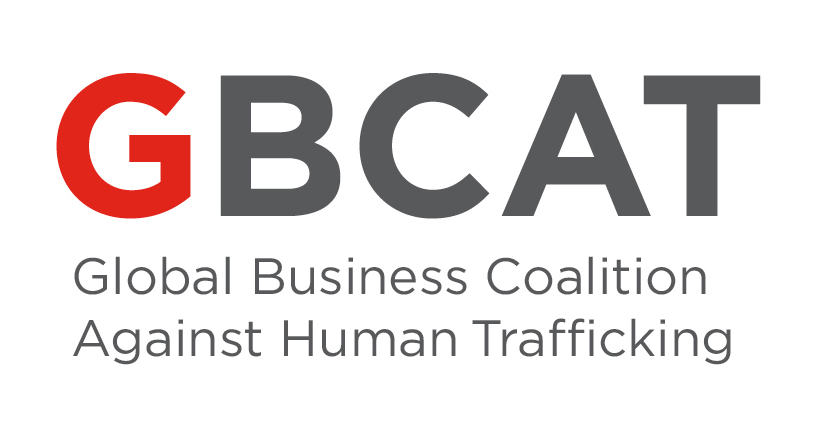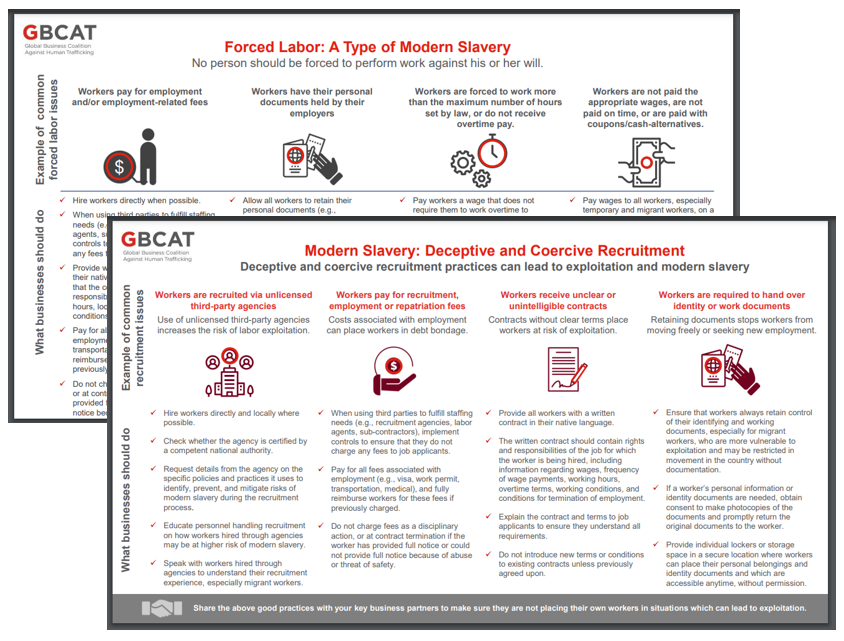+ General Resources for Business on Modern Slavery
- ILO Indicators of Forced Labour: A description of the most common signs or “clues” that point to the possible existence of a forced labour case, to help “front-line” workers such as labour inspectors, trade union officers, NGO workers and others to identify persons who are possibly trapped in a forced labour situation, and who may require urgent assistance. ILO
- Training Videos: What is Modern Slavery: Short animations useful for training workers and stakeholders on modern slavery, human trafficking, child slavery, and other topics. Freedom United
- Modern Slavery: An Introduction: Guide to gain an understanding of the fundamental principles of modern slavery. The Mekong Club
- Combatting Forced Labor: A Handbook for Employers & Businesses: Guidance material and tools for employers and business to strengthen their capacity to address the risk of forced labour and human trafficking in their own operations and in global supply chains. ILO
- Base Code Guidance: Modern Slavery: Guidance for companies on addressing modern slavery risks in their operations and supply chains. Anti-Slavery International, ETI
- Business Responsibility on Preventing and Addressing Forced Labour in Malaysia: Practical guidance for employers on how to identify risks of forced labour in company recruitment, employment, and sourcing practices, and how to effectively prevent and eliminate these risks. While focused on Malaysia, its recommendations are relevant to all markets in which modern slavery is a risk to business. ILO
- Business: It's Time to Act: Decent Work, Modern Slavery & Child Labour: A quick overview of the steps businesses can take to help eliminate modern slavery. UN Global Compact
- Navigating Through Your Supply Chain, Toolkit for Prevention of Labour Exploitation and Trafficking: This risk management toolkit has been developed to give companies a brief overview of what labour exploitation and trafficking are, as well as to demonstrate the risks for businesses, and how involvement in such scenarios can be effectively avoided. HEUNI
Identify Geographic and Industry-level Risks
- Country Reports on Human Rights Practices: Provide country-level analysis of forced/compulsory labour issues in practice including relevant laws and enforcement gaps. U.S. Department of State
- Global Slavery Index: A country by country ranking of the number of people in modern slavery, as well as an analysis of the actions governments are taking to respond, and the factors that make people vulnerable. Walk Free Foundation
- Human Trafficking Knowledge Portal: Includes a database of case law and legislation across multiple countries with a focus on human trafficking. UNODC
- NORMLEX Information System on International Labour Standards: Information on national labour laws, country ratifications of ILO conventions, and comments made by supervisory bodies on countries’ implementation of those conventions. ILO
- Forced Labour Commodity Atlas: A database of 43 commodities and their relationship to forced labor and other forms of exploitation at the base of global supply chains. Verité
- List of Goods Produced by Child Labour and Forced Labour: A comprehensive analysis by country of what products may include production risks of child labour and forced labour in the world today, including in the formal and informal sector. U.S. Department of Labor
+ Identify, Prevent, and Address Modern Slavery Risks
Manage Modern Slavery Risks in Recruitment of Workers by the Business and Using Recruitment Agencies
- Best Practice Guidance on Ethical Recruitment: Good practice steps taken by some companies that may serve as examples or models for other companies looking to implement ethical recruitment policies, and drive change at the recruitment agency level. *Interfaith Center on Corporate Responsibility *
- Six Steps to Responsible Recruitment: Outlines six steps to implement the Employer Pays Principle. IHRB, Leadership Group for Responsible Recruitment
- The Employer Pays Principle: This Responsible Recruitment Gateway provides access to a range of tools and information to help companies move towards the ‘Employer Pays’ model of responsible recruitment. IHRB
Recruiting Migrant Workers
- Due Diligence Toolkit for Fair Recruitment: Helps businesses, especially SMEs, to set out a due diligence process when hiring workers from abroad. It features step-by-step guidance for companies throughout the recruitment process. ILO
- Fair Recruitment Video: A short and simple video explaining the ILO General Principles and Operational Guidelines for Fair Recrtuiment. ITC
- Fair Hiring Toolkit: Offers tools, guidance, and approaches to support the responsible recruitment and hiring of migrant workers in global supply chains. Verité
- Responsible Recruitment – Remediating Worker-Paid Recruitment Fees: Identifies the challenges related to reimbursing recruitment fees and provides recommendations to businesses on how to apply remediation policies across their activities. IHRB
- The Dhaka Principles for Migration with Dignity: Provides key principles that employers and migrant recruiters should respect at each stage of the recruitment and migration process to ensure migration with dignity. IHRB
Manage Modern Slavery Risks across the Operations of Business
- Addressing the Retention of Identity Documents: A call to business to take action to address the retention of identity documents and its associated risk of labour abuse. References to relevant international standards and links to additional resources provide further guidance to business. UN Global Compact, Verité
- Guidance on Operational Practice and Indications of Forced Labour: Guidance on how to spot the signs of definite, strong, and possible indicators of forced labour for both auditors and audit readers. It proposes a list of indicators, based on operational practice, which either independently or in various combinations, can increase the risk of forced labour through a worker’s employment cycle. SEDEX
- Managing Risks Associated with Modern Slavery: A Good Practice Note for the Private Sector: A comprehensive resource including good practice examples as well as practical tools and checklists which are included at the end of the document, including pre-screening questionnaires and guidance on workplace assessments. Ergon Associates, ETI
- Modern Slavery SME Toolkit: Practical guidance for SMEs on how they can prevent modern slavery in their business operations. STOP THE TRAFFIK, Shiva Foundation
Manage Modern Slavery Risks across the Supply Chain and with Business Partners
Remediate Identified Cases of Modern Slavery
Child Labour
Sex Trafficking
+ Business Policies, Practices, and Management Systems
Develop a Business Code of Conduct
- Anti-Human Trafficking Business Authentication Criteria: Country and Site Level: Criteria that can be used by any organization to help it design an effective and transparent system for preventing human trafficking in its operations and those of its supply chain. It can also be used by an organization or an independent third party to authenticate the scope and effectiveness of the organization’s anti-human trafficking efforts. Verité
Develop a Supplier Code of Conduct
Develop a Complaint/Grievance Mechanism
Partner with Victim Support Organizations
- Interactive Map for Business on Anti-Human Trafficking Organizations: A global map of organizations and initiatives supporting business on anti-modern slavery efforts. Find organizations working with the private sector to end forced labour, child labour and modern slavery based on geography, industry, and issue area. BSR, GI-TOC, Alliance 8.7
- The Global Modern Slavery Directory: A database of organizations that address all types of human trafficking, including direct service providers, as well as groups that carry out awareness, advocacy and prevention efforts, or organizations that may assist victims of trafficking while addressing related issues. Polaris
+ Industry Specific Guidance
Apparel and Footwear
Financial Services
- Modern Slavery: A Resource Guide for the Banking Industry: Guidance for the financial services sector to identify new money laundering trends that may be linked to slavery and in doing so, can also help to offset the risk to their own organization from illegal and fraudulent businesses. The Mekong Club
Food and Beverage
Hospitality
- SEE Formula: Designed for the hospitality sector, provides guidance on scrutinizing and engaging with vulnerable staff and ensuring businesses have proper procedures to manage risks. Anti-Slavery International, IHRB
- The Stop Slavery Blueprint: Guidance with recommended action and templates to set up strong processes and protocols to address risk of modern slavery within a hospitality company’s business and supply chains. Shiva Foundation
Information and Communications Technologies
Mining






